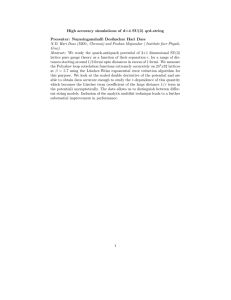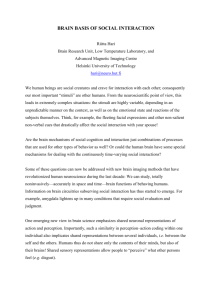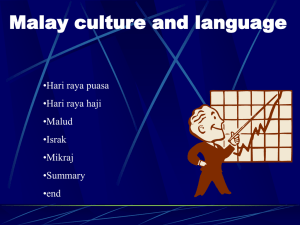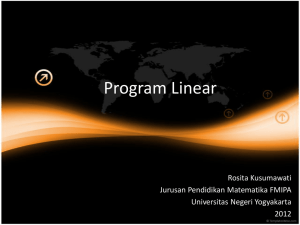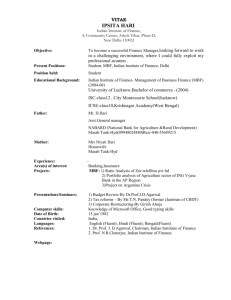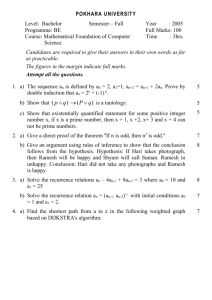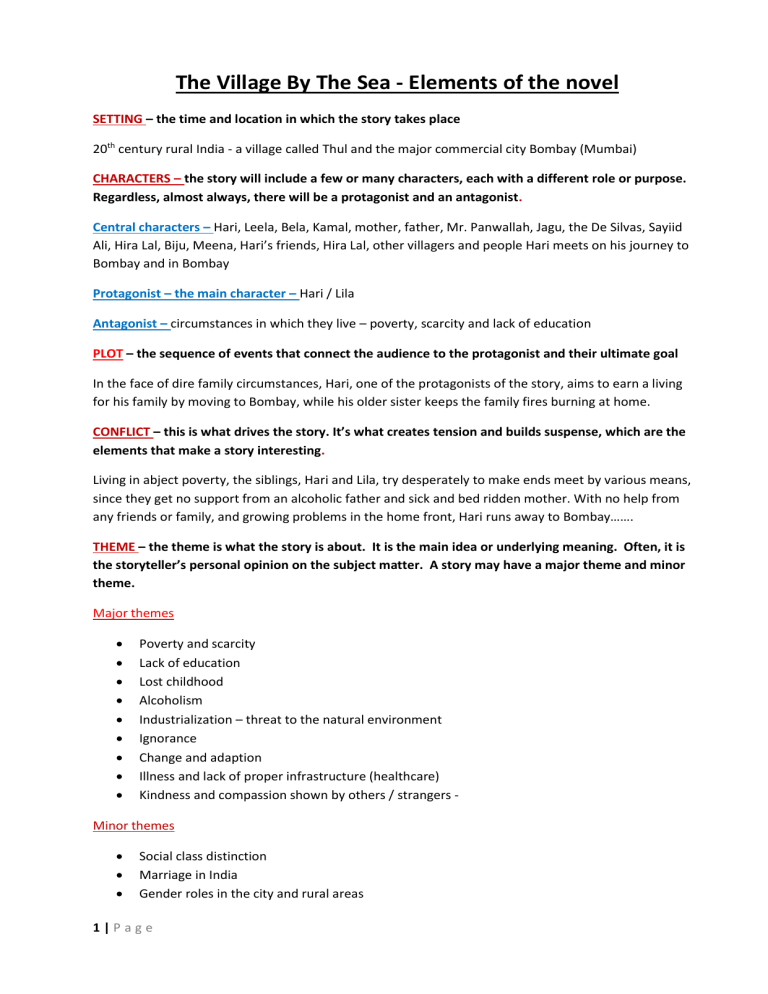
The Village By The Sea - Elements of the novel SETTING – the time and location in which the story takes place 20th century rural India - a village called Thul and the major commercial city Bombay (Mumbai) CHARACTERS – the story will include a few or many characters, each with a different role or purpose. Regardless, almost always, there will be a protagonist and an antagonist. Central characters – Hari, Leela, Bela, Kamal, mother, father, Mr. Panwallah, Jagu, the De Silvas, Sayiid Ali, Hira Lal, Biju, Meena, Hari’s friends, Hira Lal, other villagers and people Hari meets on his journey to Bombay and in Bombay Protagonist – the main character – Hari / Lila Antagonist – circumstances in which they live – poverty, scarcity and lack of education PLOT – the sequence of events that connect the audience to the protagonist and their ultimate goal In the face of dire family circumstances, Hari, one of the protagonists of the story, aims to earn a living for his family by moving to Bombay, while his older sister keeps the family fires burning at home. CONFLICT – this is what drives the story. It’s what creates tension and builds suspense, which are the elements that make a story interesting. Living in abject poverty, the siblings, Hari and Lila, try desperately to make ends meet by various means, since they get no support from an alcoholic father and sick and bed ridden mother. With no help from any friends or family, and growing problems in the home front, Hari runs away to Bombay……. THEME – the theme is what the story is about. It is the main idea or underlying meaning. Often, it is the storyteller’s personal opinion on the subject matter. A story may have a major theme and minor theme. Major themes Poverty and scarcity Lack of education Lost childhood Alcoholism Industrialization – threat to the natural environment Ignorance Change and adaption Illness and lack of proper infrastructure (healthcare) Kindness and compassion shown by others / strangers - Minor themes Social class distinction Marriage in India Gender roles in the city and rural areas 1|Page Religion Customs and rituals in India Domestic violence Natural disasters NARRATIVE ARC – a strong story plot has a narrative arc that has four required elements of its own. Setup – The world in which the protagonist/s exists prior to the journey. The set up usually ends with the conflict being revealed. The poverty stricken home front / the struggle for survival with hardly any solution in sight Rising tension – The series of obstacles the protagonist must overcome. Abject poverty, mother’s debilitating illness, father’s chronic alcoholism, problems from his father’s drunken associates, not having any employment opportunities in Thul Climax – the point of highest tension, and the major decisive turning point for the protagonist. Hari runs away to Bombay when he learns that their dog has been poisoned by the Khanekar brother due to their father’s rising debts and irresponsibility Resolution – this is where the protagonist finally overcomes the conflict, learns to accept it, or is ultimately defeated by it. Hari returns to Thul, more mature, wise and also with sufficient savings to invest in some venture that will support his family 2|Page The Village by the Sea – questions from chapter 10 – 13 deprived of an education - a deprivation Write brief answers Chapter 10 1. Why had Mr. Panwallah brought Hari to the Worli seaface? How did Hari enjoy himself that evening? Vendors – Kiosks 2. In what ways did the heavy rain in Bombay make life miserable for Hari? 3. Why did Jagu take Hari to where he lived? What type of a house was it? 4. Although Hari found Jagu’s wife to be sharp tongued, he felt he was able to identify with her. How and why? Chronic alcoholic – Hari’s father Poverty 5. What happens in the village of Thul as a result of the terrible storm? 6. Why were the fishermen compelled to go to sea despite Biju’s warnings? Which theme of the novel does this illustrate? 7. How does Biju’s reputation in the village change after the storm? Chapter 11 The most important conversation happens here Hari took a bold and courageous step in leaving Thul and coming to Bombay because he was able to become independent, earn money, meet new people. The most important word in this chapter is CHANGE. Adapt to CHANGE …..you have to be willing to LEARN – to CHANGE - to GROW (becoming mature, developing your character, your perception of the world) – fatherly advice Optimistic(ADJ) person – optimist (Common N) - optimism (abstract N) Pessimistic person - pessimist (Common N) - pessimism (Abstract N) Mr. P changes Hari’s mind to think innovatively. He’s teaching Hari to think out of the box – how to look at the bright side. 3|Page Metaphorically speaking it’s as if Mr P is shining a torch into a dark room –he is teaching Hari to explore opportunities he never noticed / look at the bigger picture. Mr. P has planted the seed of interest in Hari / gives him HOPE (optimism) Mr. P – biggest change agent / catalyst / mentor / advisor / teacher / trainer Mr P has instilled in Hari an interest to learn… Mr. Panwallah has started the process of changing Hari’s mindset. (attitudes, your perceptions, how you view the world around you) Mr. P is teaching Hari to be optimistic. – to look at the bright side. Hidden opportunities as a result of the factory complex. Hari is ready to face the future with a lot of courage and determination. 1. Give examples from the text to show the optimistic nature of Mr. Panwallah 2. How does Mr. Panwallah inspire Hari to look at the positive side of the factory complex? 4. “You are young. You can change and learn and grow…” Discuss this statement in relation to Hari’s progress in life. 5. “The wheel turns and turns and turns. It never stops and stands still.” What does Mr. Panwallah mean by this? 6. Why didn’t Jagu mind Hari spending less time at the eating house? 7. Describe the coconut festival. What changes did Mr. Panwallah notice in Hari that day? When Hari first came to Bombay he was timid, confused, frightened and lacked self confidence. He was overwhelmed by what he felt, saw and heard in Bombay. Hari transforms into a different person >>>> He has become very self-assured and confident and independent. Chronic alcoholic – incurable alcoholic Chapter 12 – Hari returns home! Notice the descriptive language and techniques. 4|Page 1. Copy lines from the novel to illustrate that Hari’s departure from Bombay was an emotional one. How long had he been in Bombay? 2. What signs of industrialization did Hari notice on his way home? 3. Hari sees the sea in Bombay and in Thul differently. Why? 4. What signs were there to indicate that industrialization was beginning in the areas between Rewas and Alibagh? Their house was in a dilapidated 5. What was Hari’s homecoming like? 6. Give an example from the text to illustrate the happiness that the children in this family are enjoying for the first time in many years The feelings of despair and hopelessness have vanished after Hari came home. Hope springs eternal in the human heart. Lila and Hari are STILL playing the role of the mother and father. They are deprived of a childhood. Theme – lost childhood. 7. What does the brilliant evening star symbolize? – symbol of hope and happiness It is a symbol of hope / there is light at the end of the tunnel / that their dark days are coming to an end / that they are going to have a better life. 5|Page What is the most valuable experience Hari gained while in Bombay? How is that going to be useful for Hari when he returns home? 4. How does the writer paint a picture of hope and happiness in the little family that lives beside the sea? 5. Who had helped Lila and her sisters while Hari was away in Bombay? At the beginning of the novel – sad / gloomy/ dismal/ despair /fear /worry / anxiety / unhappy Chapter 12 – almost the end of the novel – happy / hopeful of a new life /joyful / positive / confident / cheerful Is Hari and Lila aware that they are deprived of their childhood and a basic education? Survial mode Chapter 13 – the family re-unites! 1. Give an example from this chapter that shows that money had given Hari confidence and pride about himself. 2. For how long had Hari’s mother been in the hospital? 7 months 3. Why did the children’s father start crying when the mother was brought home? For the first time the father feels remorse for failing as a father. He regrets his past actions. It is as if the little dog had to pay with his life for the sins committed by the father. 4. Write a few sentences about how the family celebrates Diwali. 5. Give examples from the story to show how Lila has taken on the role of the mother. 6. In what way are Mr. Panwallah and Sayyid Ali similar? ADAPT – we have to adapt to survive in an uncertain future 6|Page We have to change to face an ever changing world. 7. The location / setting in which the story begins and ends is the same. However, there are some significant differences. What are they and what does that signify? Closely examine how Hari’s life changes as he moves from Thul to Bombay. Thul >>>>>>>>>>>>>> Bombay Introductory para- Introduction – to convey the background of the story to the reader of your answer First – he meets a lot of people – Second – he finds work – the eating house and the Dingdong watch works – training, money, confidence, Third – his personality changes - he learns the ability to think differently, to think with confidence, Conclusion People - the bullock cart driver, beggar, coconut seller, ice cream seller, the butler, Hira Lal, Jagu, the policeman, the old gentleman, Mr. Panwallah 7|Page Environment – the sights, the sounds, the smells, the large numbers of people – he appreciates his own village even more Employment – which enabled him to earn money for himself The introduction Hari is one of the main characters in the novel ‘The Village By The Sea’ written by the acclaimed Indian writer Anita Desai. Hari lives with his family in a small fishing village called Thul in the western coast of India. Since they are having major financial difficulties at home, Hari decides to come to Bombay in search of work. This is the very first time that Hari ventures out of their village and we see that his life changes in many ways during his stay in Bombay. The experiences through the environment in which he spent his time – survival skills Work – employment The different nature of people he sees and meets and how he is positively influenced by them Conclusion 8|Page Becomes forward / understands how to think for himself His mind / the way he thinks changes Perceive life Conclusion The busy roads, buildings, congestion, crowds, pollution, poverty, slums, smelt Work – in the kitchen, learns how to repair watches>> the opportunity to earn money for himself People he meets – the bullock cart driver, beggar, coconut seller, ice cream seller, the butler, Hira Lal, Jagu, the policeman, the old gentleman, Mr. Panwallah, How his personality changes especially after he meets Mr. P Conclusion Do not answer the following question. To be answered later. A. In this world, change and evolution is inevitable. Justify this statement with examples from the novel. B. Hope springs eternal in the human heart. Discuss this statement in the light of Hari’s return to Thul. C. Lila was not used to being rich, even for a day. Why does the writer say this? 9|Page 10 | P a g e 11 | P a g e 12 | P a g e Goddess Lakshmi Rangoli of Lights 13 | P a g e Jalebi, soan papdi, gulab jamun etc… adapt and change 14 | P a g e He is feeling remorse and regret. He feels sorry for all his past mistakes. 15 | P a g e
